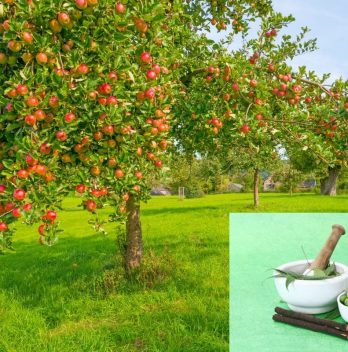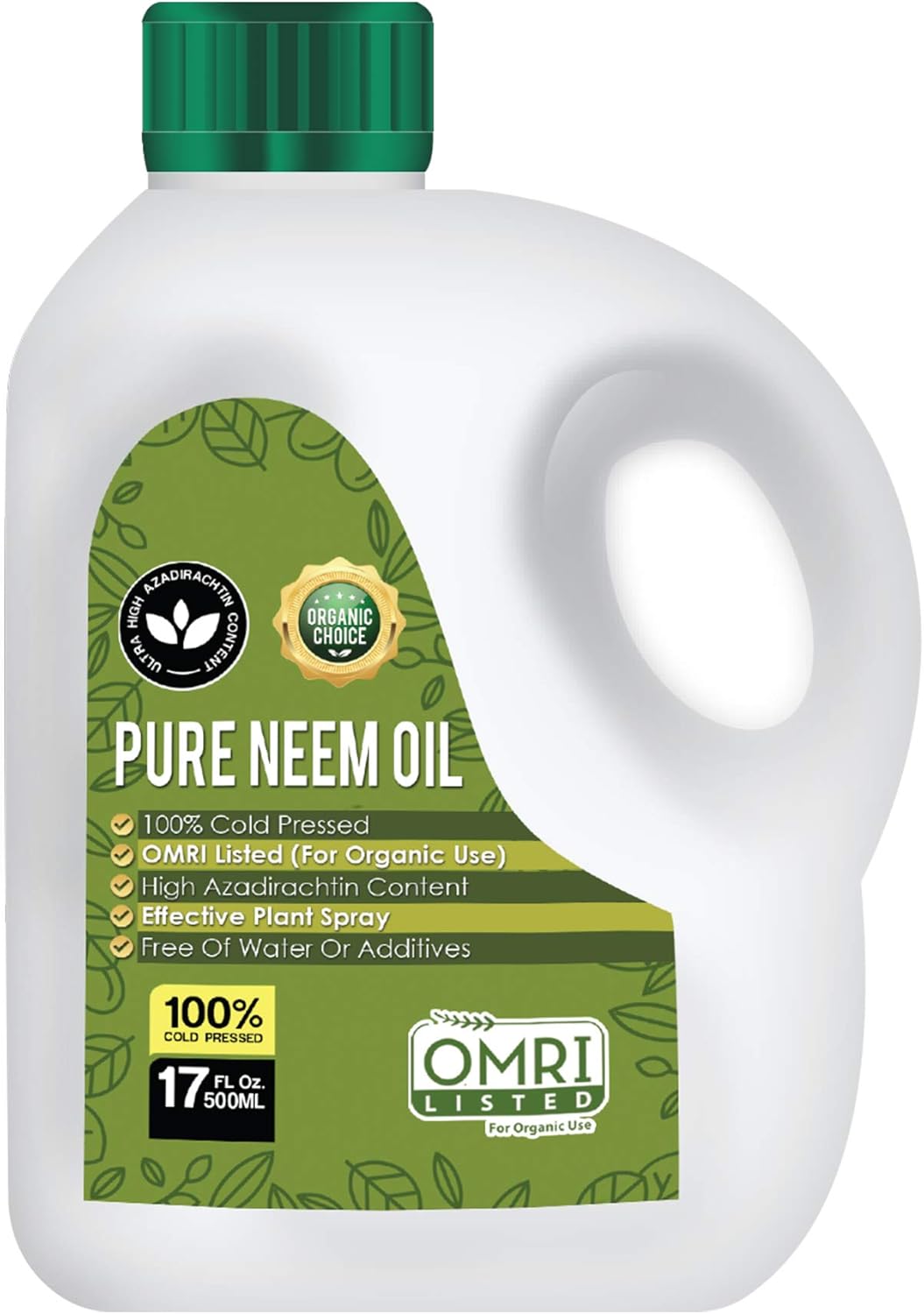You can achieve a pest-free garden or lawn with the use of neem oils. Most especially, you can use or spray neem oil on your fruit trees and protect your fruits from pests.
Neem oil is a substantial organic component applied to pest infestations and they won’t harm your plants. For an accurate and effective neem oil result, you need to know when to spray neem oil on your fruit trees at the appropriate time.
If you’re a gardener and you have varieties of fruits in your garden, you will surely need neem oils to protect your crops. Be it pear, peach, apple, plum, cherries, nectarine trees, etc, the natural neem oil pesticides will be of great use to them.
In the next paragraphs, we’ll let you know when to spray neem oil on fruit trees.
When is the Best Time to Spray Neem Oil on Fruit Trees
Fruit trees are more susceptible to aphids, spider mites, caterpillars, ants, powdery mildew, and so on. Neem oil which is derived from neem seed is an effective solution for controlling these pest problems.

Neem oil mixture is best sprayed on your fruit trees in the evening or very early in the morning. This way, the helpful insects are not affected by the direct spraying (even though neem oil is harmless to beneficial insects).
We also recommend you spray your fruit trees with neem oil when your trees are dormant. Also, it’s not advisable to spray neem oil in the hot sun as it may cause leaf damage.
How to Apply and Spray Neem Oil
You will need to dilute neem oil so it does not damage your leaves. Don’t use them concentrated even though they are natural and organic. Two tablespoons of neem oil should be mixed per gallon of water, and four tablespoons of neem oil should be mixed with 2 gallons of water, and so on. A pump sprayer is used to apply neem oil mixture on fruit trees.
As a preventative measure, you can spray a 70 percent neem oil mixture once every 7 to 14 days. However, if used to control the already infested pest area, neem oil should be sprayed every 7 days to control all leaves eating insects.
Neem oil is biodegradable; therefore, you can re-apply neem oil on your fruit tree after a rainfall.
Pure Petra Neem Oil, 100% Cold Pressed, Ultra High Azadirachtin Content
Why You Need to Spray Neem Oil on Your Fruit Trees: Uses of Neem Oil
Neem oil composition is mainly targeted to eliminate specific pests. Let’s take a look at some of the reasons you need to make use of neem oil in your garden:
- Serve as a Repellant: azadirachtin which is one of the key components in neem oil serves as an insect repellent. It will repel the feeding activities of insects on your fruit trees. Nematodes feedings on your fruit trees will also be disrupted and reduced.
- Disrupt the Life Cycle of Insects: Spraying neem oil on your garden will disrupt the life cycle of any insect development. It will as well impede the hormonal system of insects thereby rendering it difficult for insects to develop or even lays eggs.
- Kills Insects: some constituents of neem oil can kill insects rendering them harmless to your fruit trees.
- It does not Harm Beneficial Insects: beneficial insects such as bee pollinators, earthworms, lady beetles, birds, etc, remain unharmed when you spray your fruit trees with neem oil.
- Great for Lawn: neem oil is also great for your lawn. Most especially, you can apply neem oil to eliminate lawn grubs activities which can be pretty destructive to your lawn.
- Great for Indoor Plants and Safe for your House: neem oil is as well safe for indoor plants. If for instance, your indoor plants are suffering from aphid’s infestation, you can spray a mixture of neem oil to control aphids. They are safe to spray indoors. You don’t have to worry about hurting you, your kids, your pets, or your livestock.
- Safe for a Greenhouse: aphids, mites, and whiteflies tend to invade greenhouse environments. However, spraying neem oil on your greenhouse plants will help get rid of these harmful insects.
- Fungicides: neem oil can also serve as fungicide.
What Tree Does Neem Oil Come From?
Neem oil is from India. The trees that produce it are in South Asia and Africa too. This tree is called the Azadirachta Indica. Neem oil is a vegetable oil pressed from kernels.
To produce neem oil, the seeds on the Azadirachta tree are broken to separate the kernels. Industrial pressed, then press the kernels to extract oil.
Can You Spray Neem Oil on Avocado Trees?
Avocado trees can become victims to fungi and sucking insects. These can spread all over your tree and severely damage them. A natural solution is neem oil. You can spray neem oil on avocado trees to ensure the insects and fungi disappear.
Use 2 oz of neem oil per gallon of water. You can spray this mixture on the surface of your avo tree every week for 3 weeks. Another helpful mix includes 1 1/3T of neem oil, dish soap, and water. Use enough dish soap to break up the oil. Spay this onto your avo trees once or twice a month.
How to Use Neem Oil for Mango Tree?
Neem oil is good for mango trees. It’s especially effective at keeping aphids and mango hoppers at bay. Neem oil also helps prevent black spots, leaf spots, scabs, and rust leaf spot.
The best way to use neem oil on mango trees is by spraying. You can use a solution of neem oil and water. Spray this onto your mango trees at least once a month. A ratio of 2 tablespoons per gallon of water is adequate.
How Much Neem Oil Do I Spray?
Most trees and plants don’t need a neem oil spray more than once every two weeks. A solution of about 15 ml of neem oil to one gallon of water is good to start with. If you notice that this isn’t effective, add another 15 ml.
Is Neem Oil and Tea Tree Oil The Same Thing?
Neem oil and tea tree oil are not the same things. Each has benefits that the other can’t offer. Here’s what each can do:
Neem Oil: This vegetable oil can kill insects, including aphids, leafhoppers, thrips, fungus gnats, and whiteflies. It can also prevent and eradicate fungal diseases. Some of the most common are black spots, scabs, and leaf spots.
Tea Tree Oil: This natural insecticide will keep pests away. It’s also antimicrobial and has antifungal properties. You can rub tea tree oil into your tree or spray it on the leaves.
What Plants Should Not Be Sprayed With Neem Oil?
Neem oil isn’t suitable for all plants. Herbs like basil, cilantro, dill, and thyme could damage if you spray them with neem oil. Leafy crops like lettuce and spinach are also sensitive. Neem oil can cause foliage burns and leave you with an inedible harvest.
While some other leafy plants can tolerate neem oil, you need to take special care. I suggest spraying a few drops on one leaf and waiting a few days to see how it reacts. If no damage appears, you’ll know it’s safe.
Conclusion
Be it an orchard or just a couple of fruit trees that you’ve got in your garden: you can take advantage of neem oil solution to control harmful insects in your garden. Apply neem oil mixture only when the sun is down to prevent your leaves from burning from the heat.
Spraying neem oil mixture on your fruit trees from time to time will give your plants healthy improvements, free from pests and fungal diseases.
So, give your crops a healthy growth style with neem oil!
FAQ’s
When is the best time to apply neem oil to my fruit trees?
The best time to apply neem oil to your fruit trees is when they are dormant. It is recommended to apply neem oil twice a year, in the spring and fall. Can neem oil be sprayed on fruit trees in the summer? Yes, neem oil can be sprayed on fruit trees during the summer months.
However, it is important to use neem oil with care because if you spray it too much you can kill the fruit trees. In addition to neem oil, you can also use other natural treatments to control apple tree borers. If you see a sign of apple tree borers in your orchard, here are some natural remedies that you can use to prevent their infestation: Use Neem Oil on Apple Trees Neem oil is one of the most effective and natural ways to control apple tree borers. You can apply neem oil to the trunk of the apple tree using a paintbrush.
How often do you need to spray neem oil on fruit trees?
This is a difficult question. I’m going to offer several options, and I hope that one of them will be useful to you.
You could spray every week, but then you’ll need to do it in the morning when the dew is off. If you wait until the evening, you might not have enough time to get the dew off. You could spray at night. But, then you’ll have to make sure that the dew isn’t on the plants when you go to spray. And, if you don’t spray as soon as the dew is off, you could have a cloudy night, and that will mean no good spraying.
Is it a good idea to use a timer?
I would suggest that you get a timer that you can set for 20 minutes, and set it so that it’s set to start at dusk, and that it will shut off after 20 minutes. This way, you can spray when the dew is off, and you’ll be ready to go when the sun comes up. It might take a couple of weeks of testing to get it just right.
Can neem oil be sprayed directly on fruit?
Neem oil is more effective in the long term, and can be used year-round. You can apply neem oil to your fruit at any time before harvesting, but it is not usually necessary.






